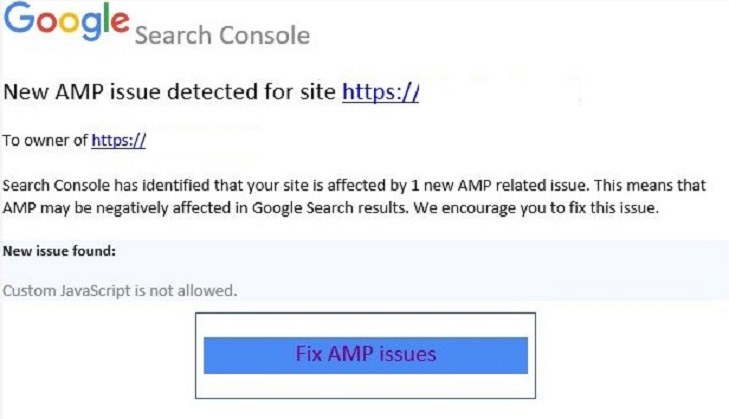Companies relying on their websites for strategic positioning, content marketing, and sales should monitor their Google Search Console regularly. This may seem obvious, but for many small businesses where owners wear many hats, taking the time to do so can seem like a low priority. We advise our small business clients to do so monthly, more often if they are running any online marketing campaigns. On behalf of one of our clients, we recently received a Google email saying: "New AMP issue detected for site..."
AMP is short for Accelerated Mobile Pages Project, which is an open source initiative. For a variety of reasons relating to its business model, Google is heavily invested in the mobile web, so when you receive an email like this, pay attention, as it is negatively impacting your website's search results. In this particular email, the reason given was: Custom JavaScript is not allowed. Integrated Media Strategies builds only open source sites and uses vendors who produce well-coded commercial open-source licensed extensions, so it seemed odd that something had changed, prompting the email.
Google provides a link to the page in Search Console where the errors are found and if you click through on the list, it is possible to see what the code is and where it is coming from. After double checking the code in the pages themselves, it was apparent that the code was not at site level, but originating at server level. The code highlighted as problematic by Google looked like this:

For people who aren't used to looking at code, this probably looks like a foreign language. But a key clue is in plain text: Monitoring performance to make your website faster. If you want to opt-out, please contact web hosting support. In this instance, hosting was provided by GoDaddy.
It turns out that GoDaddy, without telling any of their clients, had implemented this code on their shared servers. It was injecting this code onto websites, resulting in flagged pages by Google. Everyone has negative stories about hosting companies, but for small businesses, outsourcing hosting is a key function and for a few dollars a month, remains a cost-effective solution. In this instance, GoDaddy's Forums yielded a fix for this particular JavaScript issue.
Log into your hosting account, go to your cPanel, and in the top right hand corner, you'll see a button titled cPanel Admin. To the right of the button are three dots. If you click on those, it brings up a dropdown with two options. Select Help Us and then click Opt Out. The hamsters will run in the wheel for a while and your option will be saved. Done.
There have been other issues reported related to this script running on sites. In some instances it is triggering ad blockers in browsers resulting in a range of difficult-to-diagnose issues like disappearing images. You may also see a slight increase in page load times after disabling the script. Once you have completed the steps, in Google Search Console, tell Google you have resolved the issue and ask them to validate your fix. It may take a few days.





Subscribe